During a hundred days between April and July in 1994 one of the largest genocides of the last century took place in Rwanda. To date 1.1 million dead are counted. The exact number will never be known since entire villages where wiped out without a single soul left to tell about the killed. Like most people we didn’t know much about the events leading and during the genocide and thus visited the Genocide Memorial in Kigali where about 250,000 victims of the mass murder are buried in mass graves.
It all started in the 19th century with the colonization of Rwanda by the Germans. The established an artificial separation of the people in Hutu and Tutsi. The 10 % of the population owning more than 10 cows where Tutsi, the rest Hutu. After the first world war Germany lost all colonies and Rwanda was from then on controlled by the Belgians. They pushed this separation to better control the population and only Tutsi where allowed to get higher education and in higher offices. Naturally this lead to a strong imbalance in the society which summited in the well planned and fast genocide in 1994. The international community failed to intervene and even withdraw their troops from the area as the slaughter started. After the genocide the UN and the “first world” countries promised to never let such an event ever happen again. The value of this promises can plainly be evaluated when looking at the events happening right now in Syria and Iraq.
The degree of violence erupted in 1994 is described in detail in the Genocide Memorial. Killer squats with blunt weapons applied methods of cruelness I don’t want to get in detail with but showing the deep hate in the country. Apart from murder and mutilation Tutsi women were systematically raped by HIV positive man leaving 500,000 million women raped, and this is only the confirmed number!
The visit to the Memorial left us in a shocked stage. To this day I think back a lot to this visit. We still cannot figure out how the country could recover from this events. Statistically every fourth man over the age of 40 is a murderer. But surprisingly enough the country is developing very well and everywhere is a general friendly and very cheerful atmosphere. We talked to Rwandans and they said “We are all victims of the genocide, regardless of the deeds”. This seems to be a good approach to form the new Rwanda.
We returned from the Memorial to the Discover Rwanda Hostel and had a rather funny incident with our laundry. We gave them our dirty laundry the day before and where assured that it will be ready the next day. Keep in mind that it is still rainy season in Rwanda and there is at least one biblical downpour a day. We enquired about the dryness of our laundry and got the confusing reply that its wet again. Again? Yep, they hanged the laundry outside and the afternoon rain got it. We asked how they imagine the laundry to ever get dry before dry season and why they try to dry stuff in the rain. The clever reply was “the trainees did the laundry and didn’t know that they should dry it in the rain and anyway there are sometimes days without rain”. I guess one has to pick up the trainees from a very basic level…
The laundry incident had us stay a day longer at the hostel. We used the time to drive the perfect mountain road in Rwanda with the empty bikes to the Lac Kivu (Rwanda is the only French speaking country on our trip, also the only with right side traffic since Ethiopia, all the remaining countries are left side again).
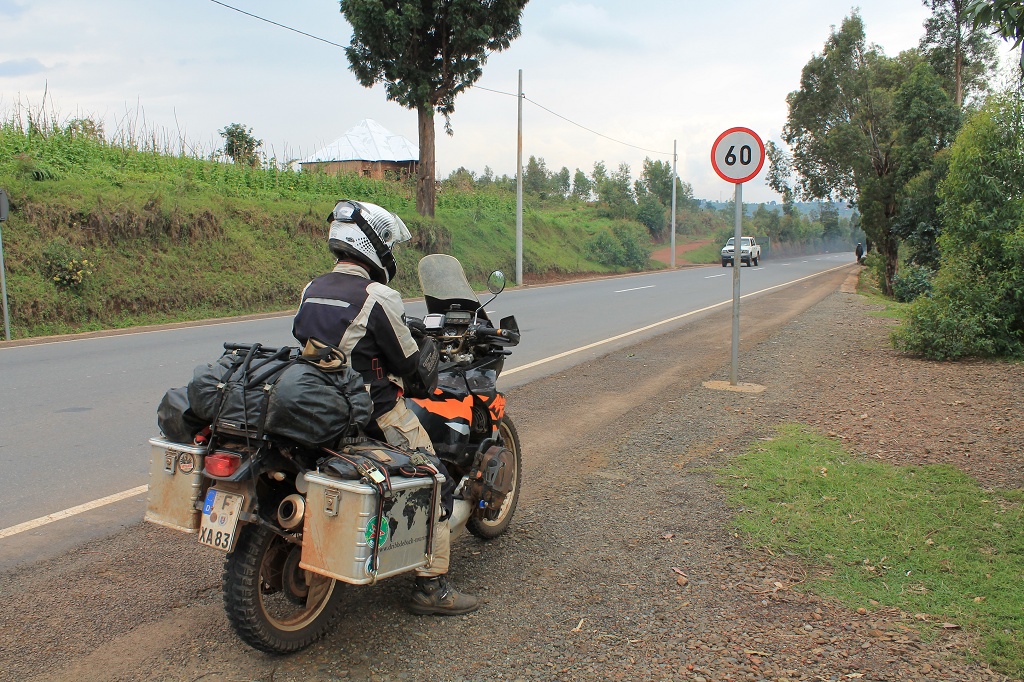

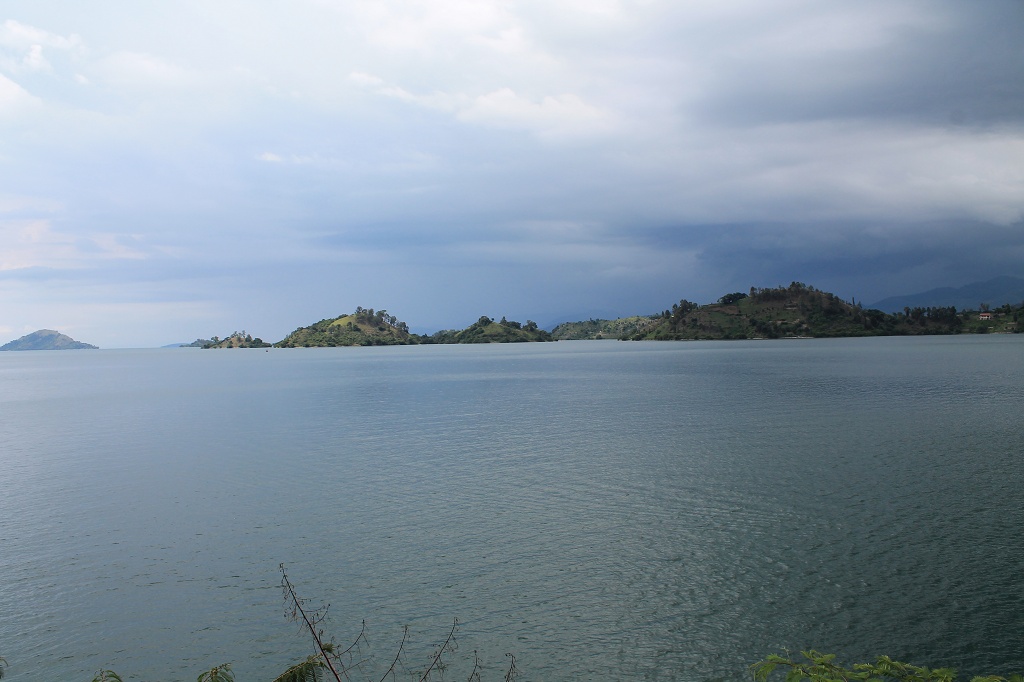
The 140 km ride to the lake was probably one of the nicest rides on this trip. Perfect mountain roads, perfect tarmac and no traffic. This was in sharp contrast to the ride back, which was one of the worst during the trip. The rain hit us with thunderstorms in the mountains. No visibility since we were up in the clouds and the temperature dropped to 12°C. Since it was so hot during the day we didn’t bring any warm gear. We had to push on to reach Kigali before sunset, which didn’t work out. We returned after dark to the hostel with blue frozen hands and lips and enjoyed one of the best hot showers ever.
The next morning we left towards Tanzania. We were surprised the city which was so full of life and chaos the night before was empty just like in a zombie movie. No car on the road, almost no people to be seen. It was the last Saturday of the month, this day is a special day in the Rwandan culture. Everybody has to work on this day for the community or the family. We saw on our way out plenty of people collecting garbage, cleaning the road or the garden or doing maintenance work. Amazing. Especially when you have the fantastic roads all to yourself! On the way to the border we of course hit a big storm again. Luckily we came through after the worst was over but the freshly collapsed trees blocking the road gave us a good impression on what we missed out…
The crossing into Tanzania was hassle free and fairly fast and we did a good distance this day. With reaching Tanzania we were supposed to leave the rainy season behind us. Yet, someone forgot to inform the rain about that.
Soon our tanks were running low and we had to find an ATM and gas station. We only changed our Rwandan Francs into Tanzania Shilling at the border, which was not much. An ATM was not to be found just like something an European would call a gas station. We did get some black market gas which ensured us to be able to reach the next town with an ATM and a gas station. The town of Ushirombo was our destination. Daniel tried the ATM which unfortunately decided to switch to “out of order” with his VISA card still in. Crap! It is Saturday evening in a strange country, what do you do? The only sensible thing, ask the guy with the Kalashnikov. He politely pointed us to a man who was from this bank but obviously at this time not on duty. He went into the bank, restarted the machine and Daniel got his card back. Money though could not be obtained with foreign cards in this town. The nice guy from the bank took us to a good guesthouse for the night. To make matters more complicated it could only be paid in Tanzania Shilling, which we didn’t have. The not existing English skills of the lady weren’t exactly helping either. In Tanzania we for the first time have language issues, many people don’t speak English. Well, it’s their right, we are the guests and should soon learn some basic Swahili. Another helpful gentleman overheard us struggling with the lady and offered us to change our USD into Shilling. There are so many helpful and nice people here!
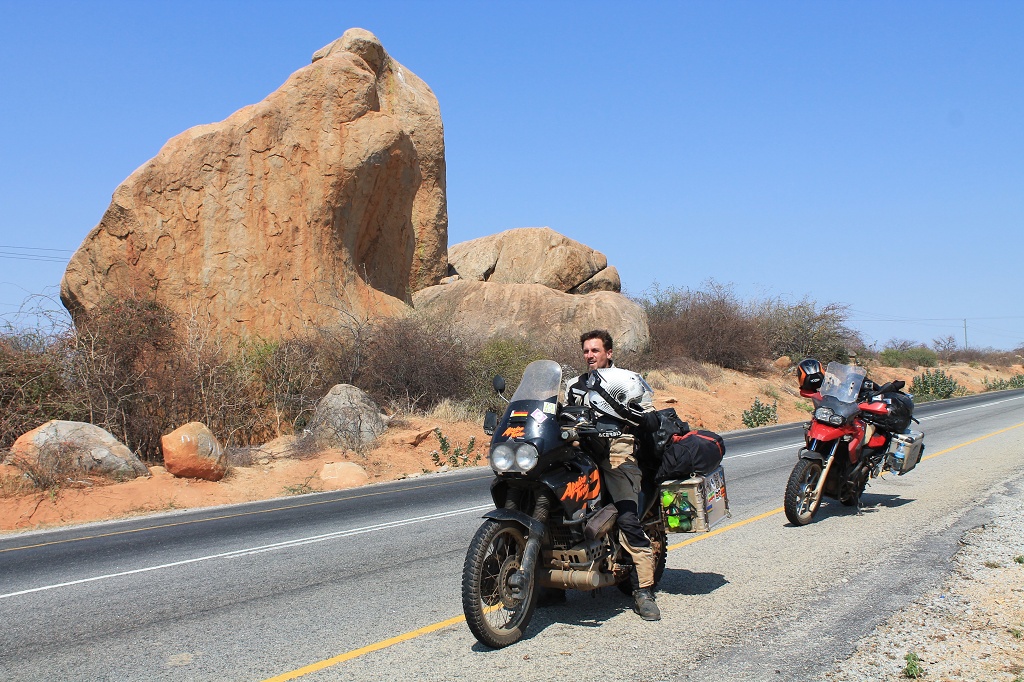

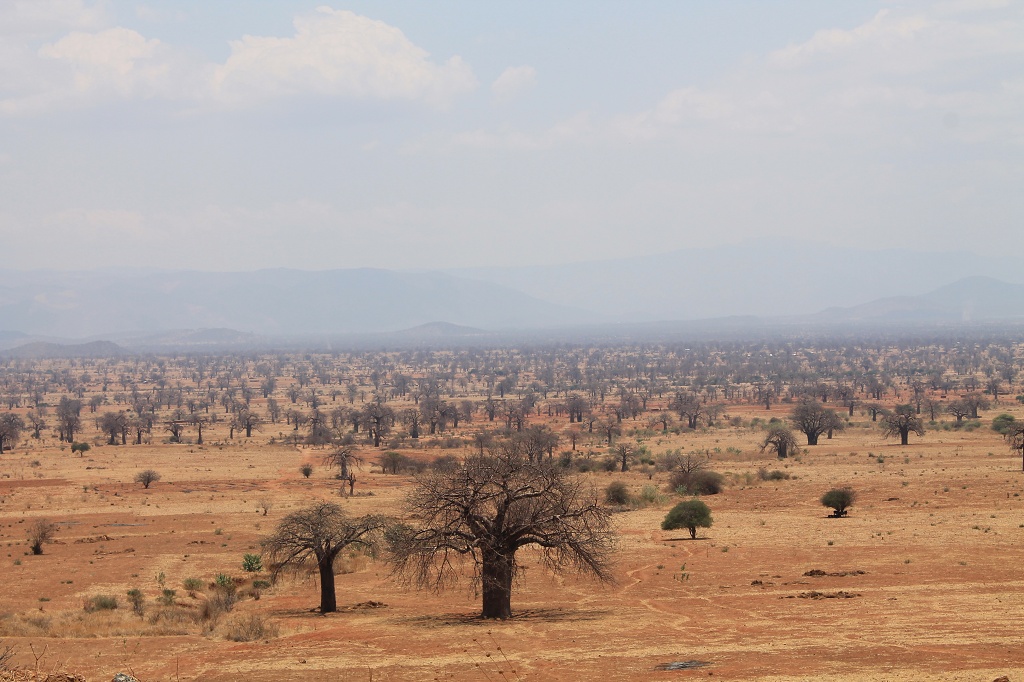
Our plan was to get fast through Tanzania and spent some time in Malawi. So the next day was a 550 km ride on the in general good highways. Only issue in Tanzania are the countless speed controls and the uncertainty of how fast we are actually allowed to go. With their old Star Trek like radar guns they are only able to measure the speed of the first of us three. So only this one has to pay even though we are obviously going the same speed. Daniel was the first to be caught. We were going 116 km/h were only 50 km/h were allowed, Whoops… In Germany you wouldn’t drive a vehicle in a long time again but here every speed offence has the same penalty, 30,000 shilling, which is 15 €. Since we all go the same speed we split the bill 😉 After this we spent the night in Manyoni.
On the day after we wanted to reach Mbeya. On the way we had to pass through Dodoma, the small capital city of Tanzania. We drove towards the Mtera Dam, where you need a special pass to be allowed over the dam. Only single file traffic is possible over the dam, so we waited at a traffic light to signal us the OK to go. When it turned green Davids bike made no sound, the electric was entirely gone. We tried to start the bike with a jumper cable. It started but would die at idle RPM. David tried to keep the engine running at high RPM and to move on but this proved to be impossible. We were 110 km away from the next town where we might have the small chance to get spare parts and especially the urgently needed internet connection to try to find the problem. The only option getting there was towing David on his bike. So we connected his bike to mine and I started towing him. I never towed anything on the bike before and it was not that easy since we soon came to a mountainous region with many sharp turns and on top of that loose gravel on the tarmac in the corners. On the way we got into a speed control. Not a joke. We were going 66 km/h in the middle of nowhere were only 50 km/h were allowed. This time we luckily could talk us out of the ticket with the argument that it’s very hard to break when towing someone…
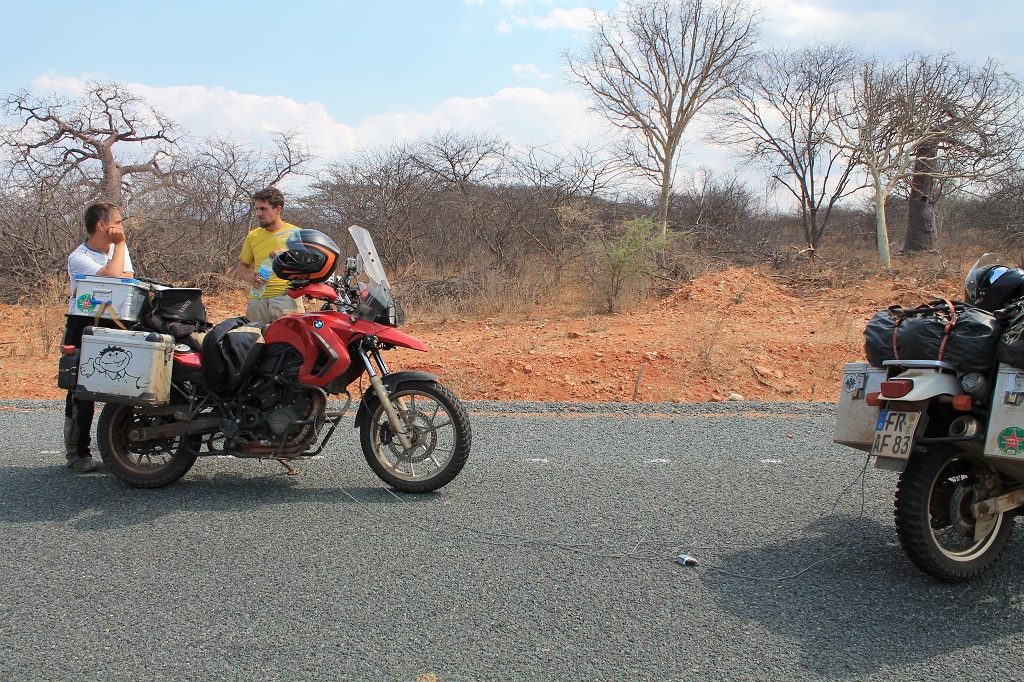
In a special sharp corner with no visibility and gravel in the mountains a lorry cut the corner, David and I had to swirl and get slower, this lead to the towing robe getting tangled in his front wheel which instantly blocked. David had a slow speed crash, cracked his clutch lever, bended the steering a little, scratched his bike and his helmet. Helmets are really a good thing to wear. He was luckily not injured. We had to push on to reach Iringa, the next city. The last 20 km where off road with gravel and bits of sand. Really unnecessary! It was tough but we made it before sunset. Rough day.
We got a triple room in a hotel with a good yard to work on the bike and started the work. The battery was obviously totally fried but weirdly enough we couldn’t start the bike with the jumper cable or with rolling on. It looked very serious. We disassembled a lot of the bike to find the issue, but everything looked fine. On the second evening a very dark and sad “Davids journey is over” feeling got over us. David phoned many mechanics and one from BMW in Germany said, just try a good new battery. We tried it with Daniels battery and voila, the bike fired up. Strange, but who cares? Now just the problem of getting a new battery. Batteries strong enough to start a big bike are not easy to come by in Africa. One could use a car battery, but they are quite big and heavy. So we got two Boda Boda batteries, put one in the original compartment and the second in the top case, wired to the first one. This worked out. Now David has the biggest battery of us 😀

Relieved in a very good mood we started towards the Malawi border. After passing the town of Mbeya we headed south and spent the night some 40 km before the border at a nice small campground. The Bongo Camp is a community project, where the income of the camp is financing the local school. The “dinner hall” is during day time the school hall. Nice project and since the town is in the mountains we had a good temperature to sleep. We didn’t know at this time that this would have been the last cold night for a long time.
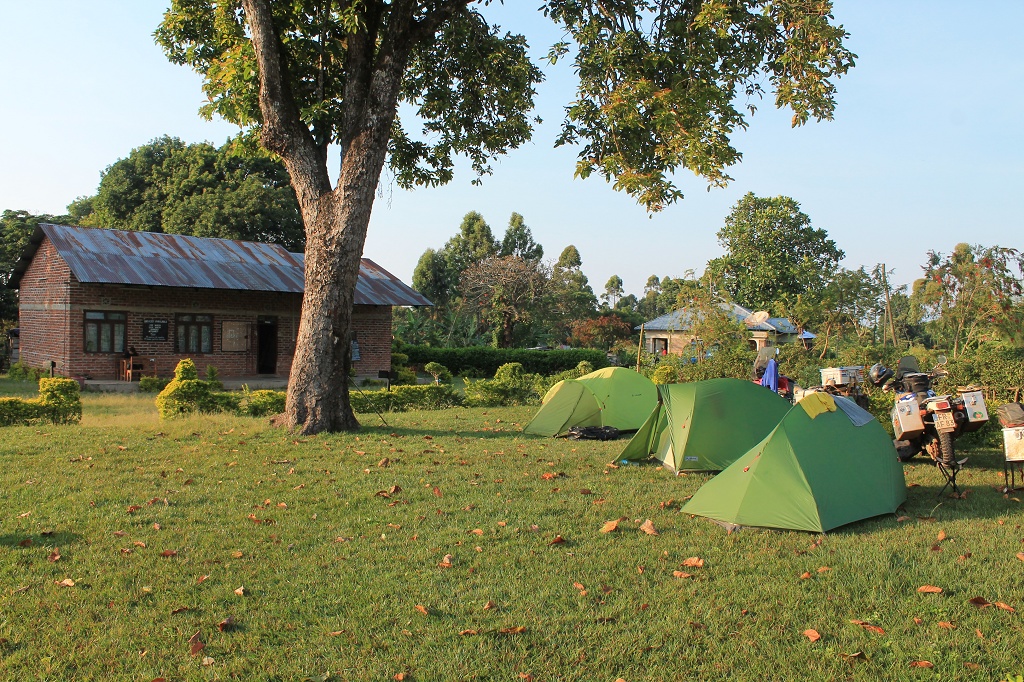

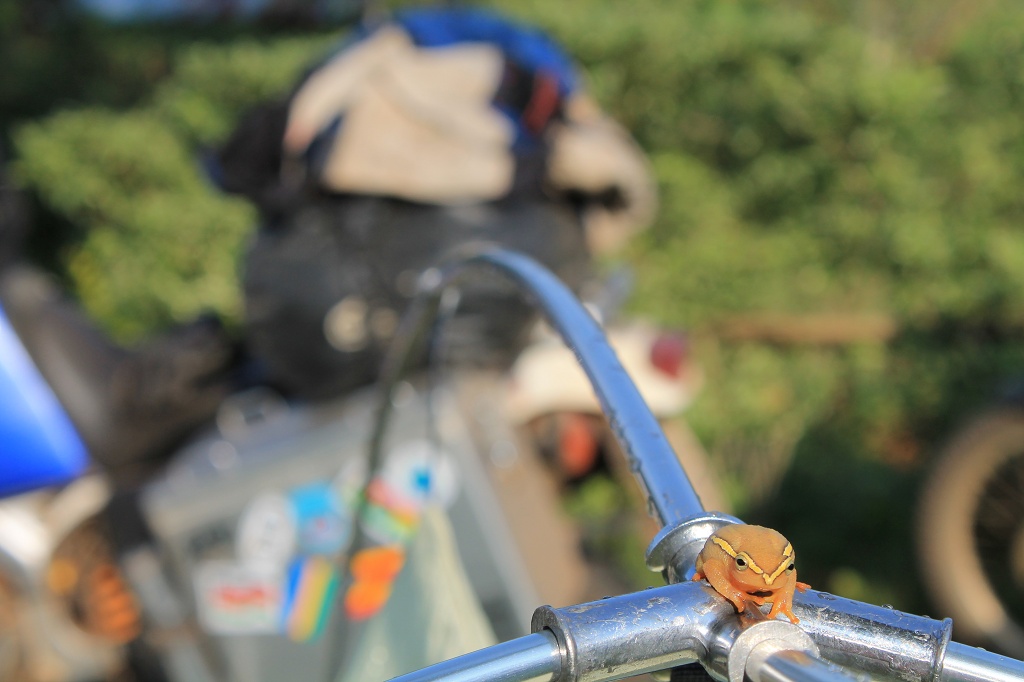
The crossing into Malawi was hassle free and free of charge for Germans (nice!) but the first time we got our vaccination passes and fever checked. The fear of Ebola reached the east. Of course you could just avoid the temperature taking by leaving through another exit or immigrate while the “doctor” is taking his 2 hour lunch break. Very effective measures.
Temperatures in Malawi god soon very high and we easily reached the 40°C plus range during day time, with the high humidity anything physically had to be avoided.
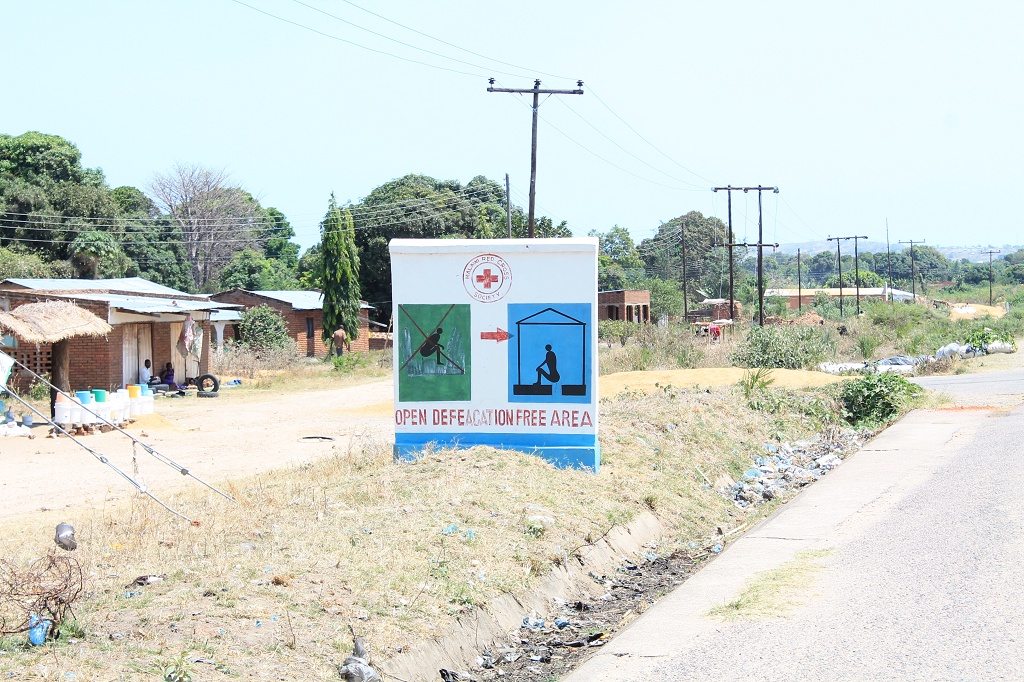
We had a short stop in Karonga and visited the Museum where some fossils from this region, including the Malawisaurus are displayed. The place is partially run by Biologists from Frankfurt, where I studied and I remembered the first semester lecture from Prof. Schrenk who is a Paleoanthropologist and discovered fossils of human ancestors here in northern Malawi.
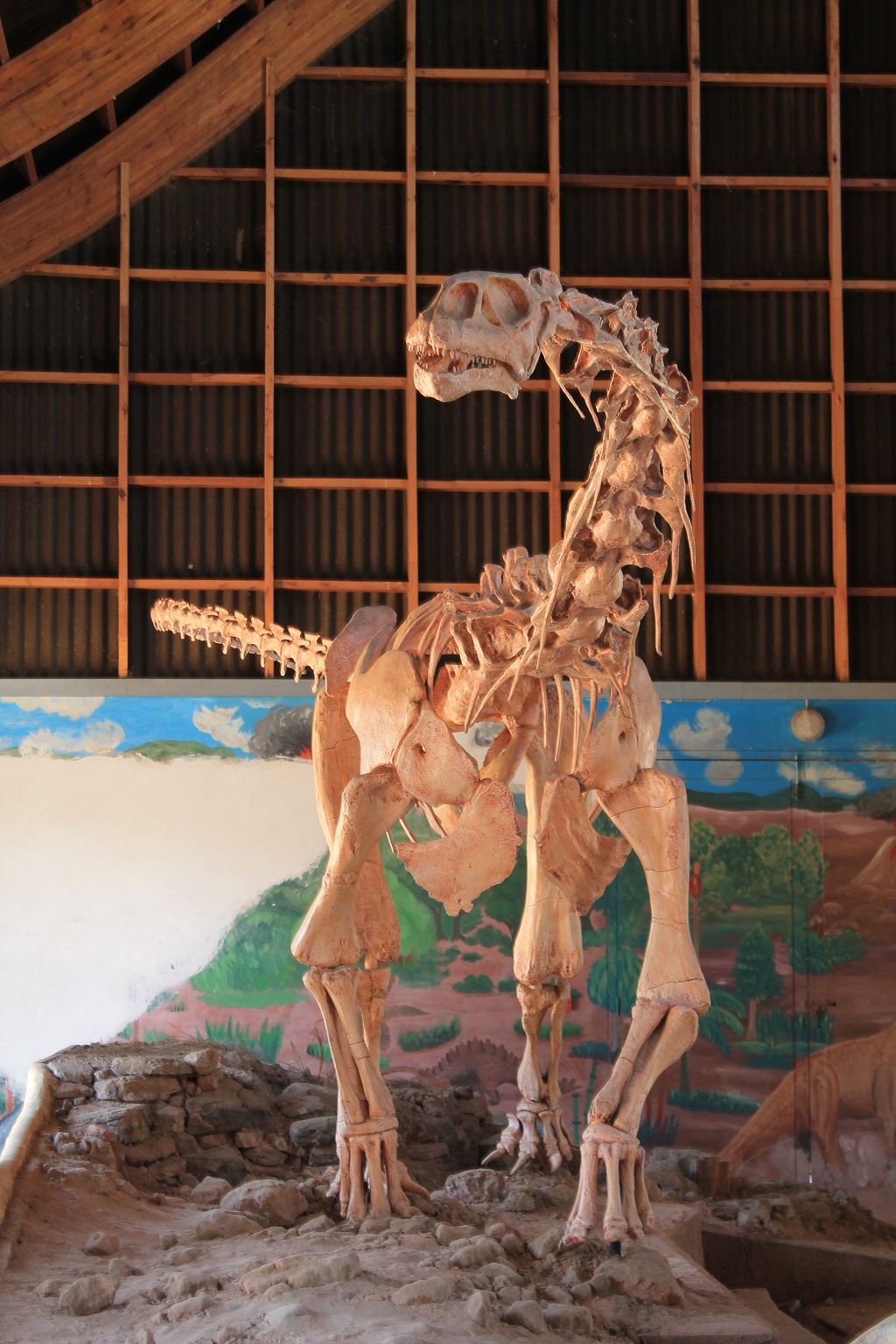
After rushing through Tanzania we wanted to take it easy in Malawi, so we spent the next three days at the Sangilo Sanctuary directly at the Lake. The small place is run by the British man Marc who keeps plenty of animals around to not be so alone. The small zoo includes two gigantic dogs, Samson, the bigger one, weighs 78 kg, a large boar, a giant turkey, some ducks and cats.
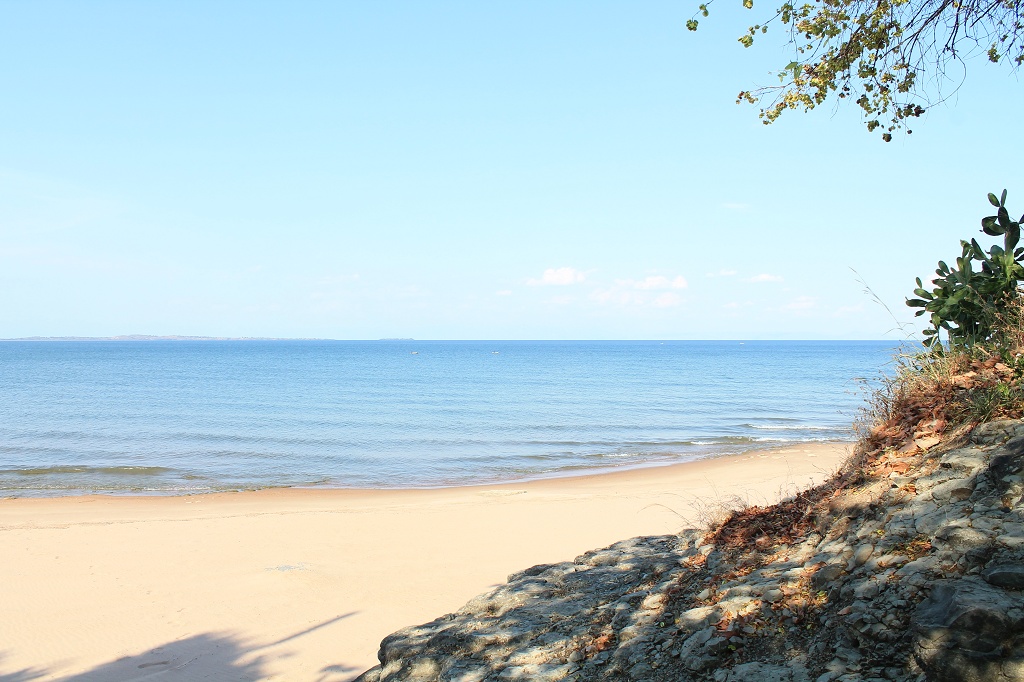

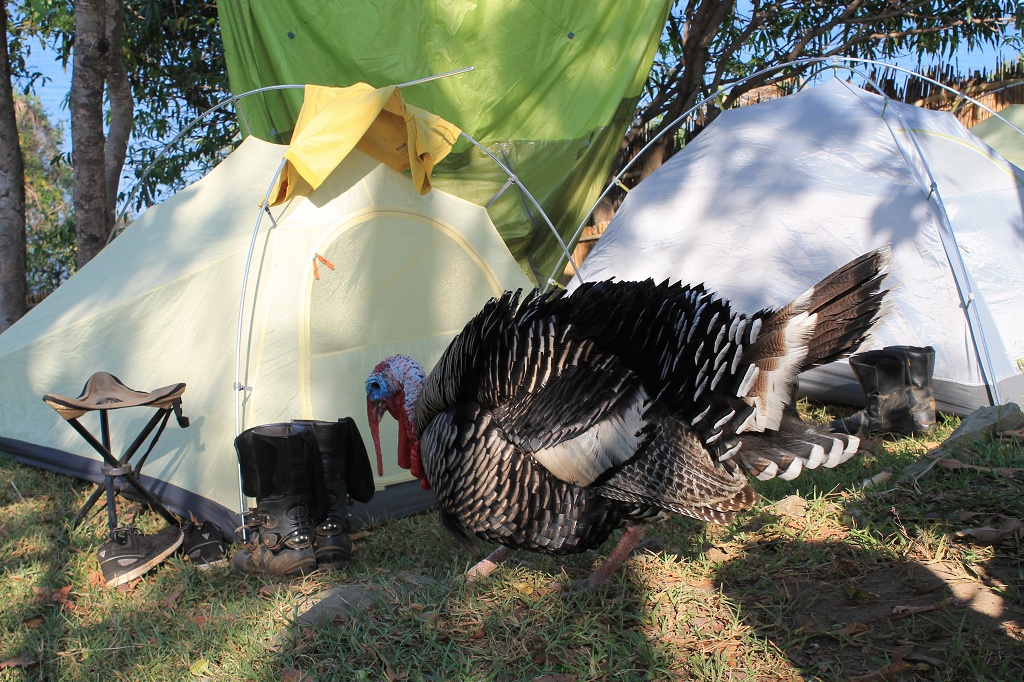
Funny enough Ewan McGregor and Charley Boorman stopped here during their “Long way Down” TV-show and Marc had some funny stories about the guys.
I heard before about the beauty of Lake Malawi but standing in the clear warm water at the sandy beaches was better than expected. Plus we had a good time with the Malawians who are in general pretty relaxed and friendly. A good place to hang out for a while.
We used the time at Sangilos to do the necessary oil and filter change on our bikes, the last one on this trip… Since we just can’t not drive our bikes for a day we took the bikes without luggage up a bad gravel road to Livingstonia, an old mission town in the refreshing “less hot” mountains with some tall water falls nearby.
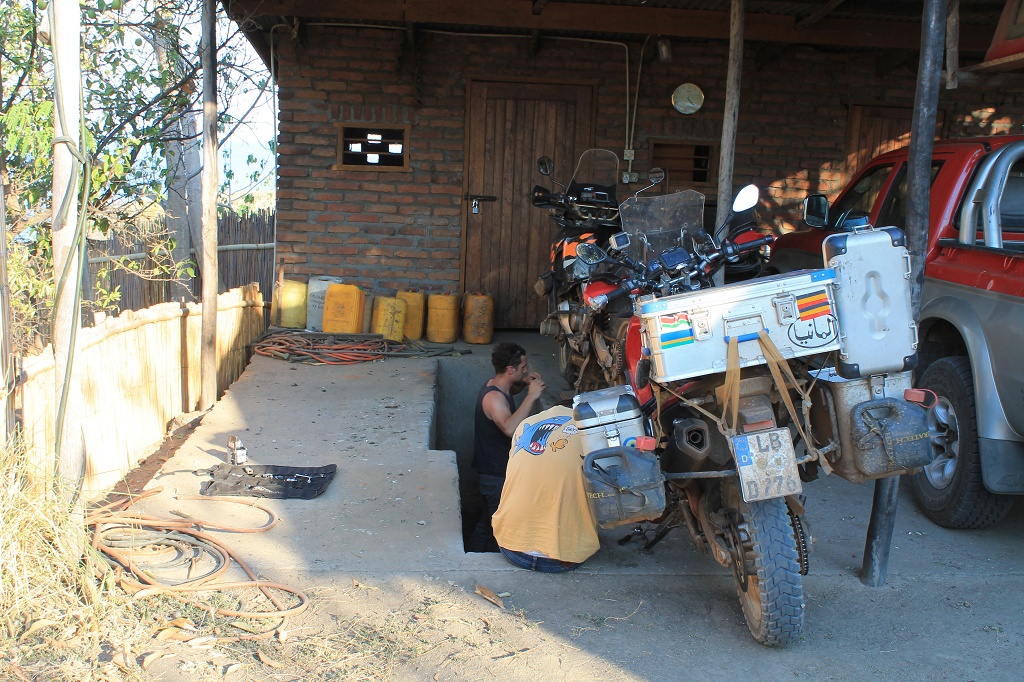

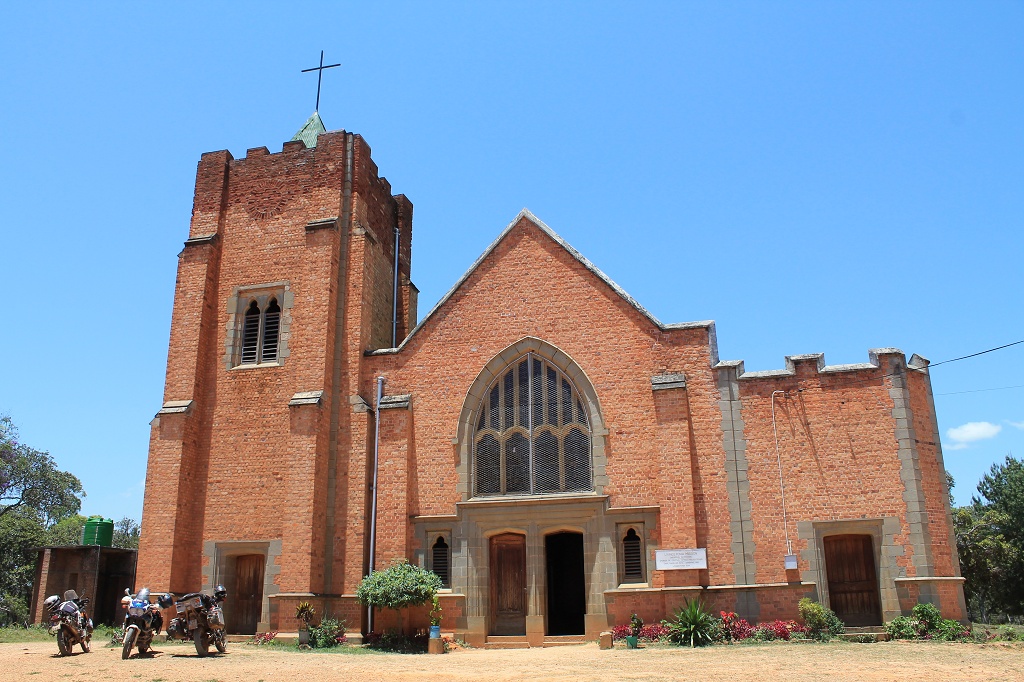
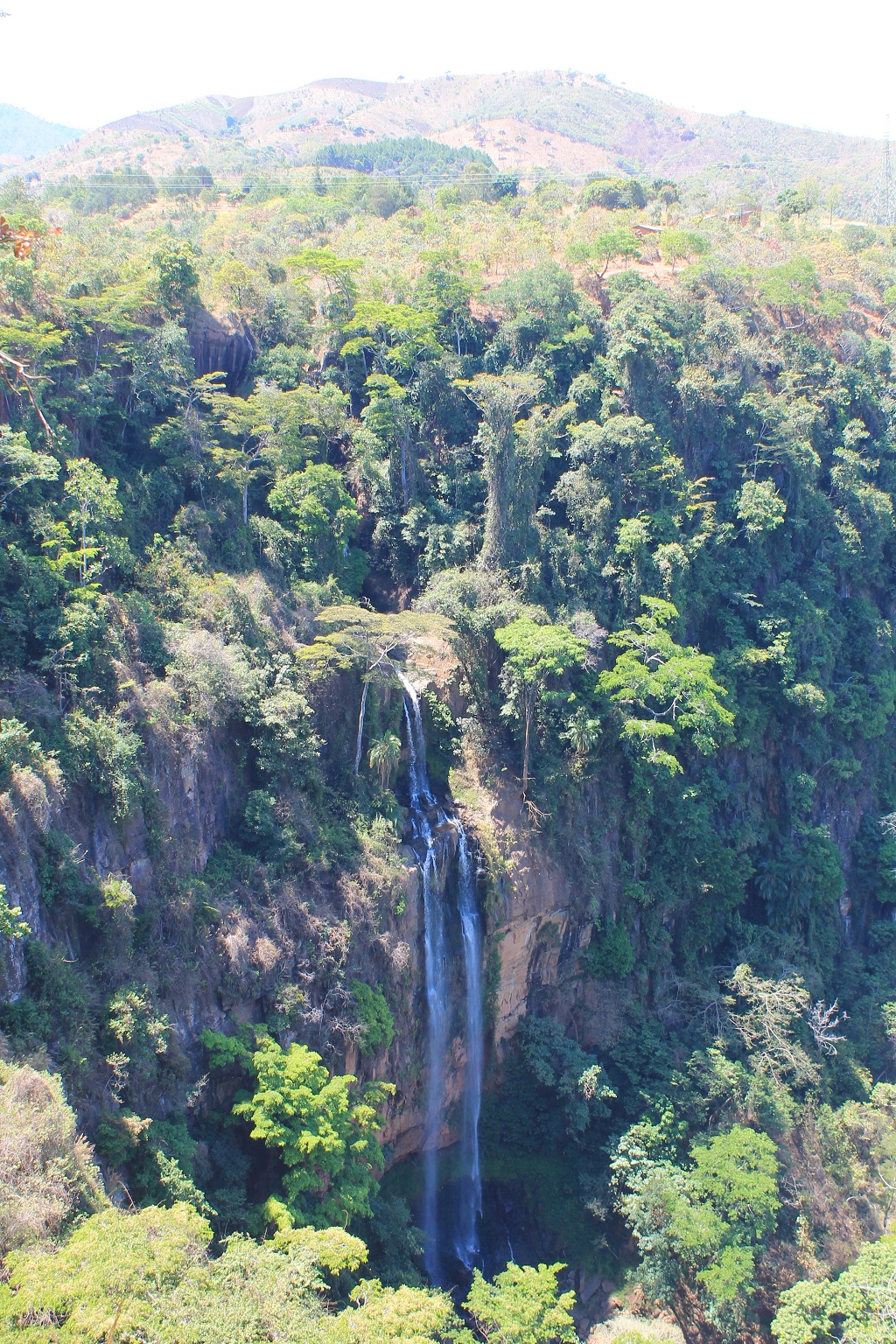
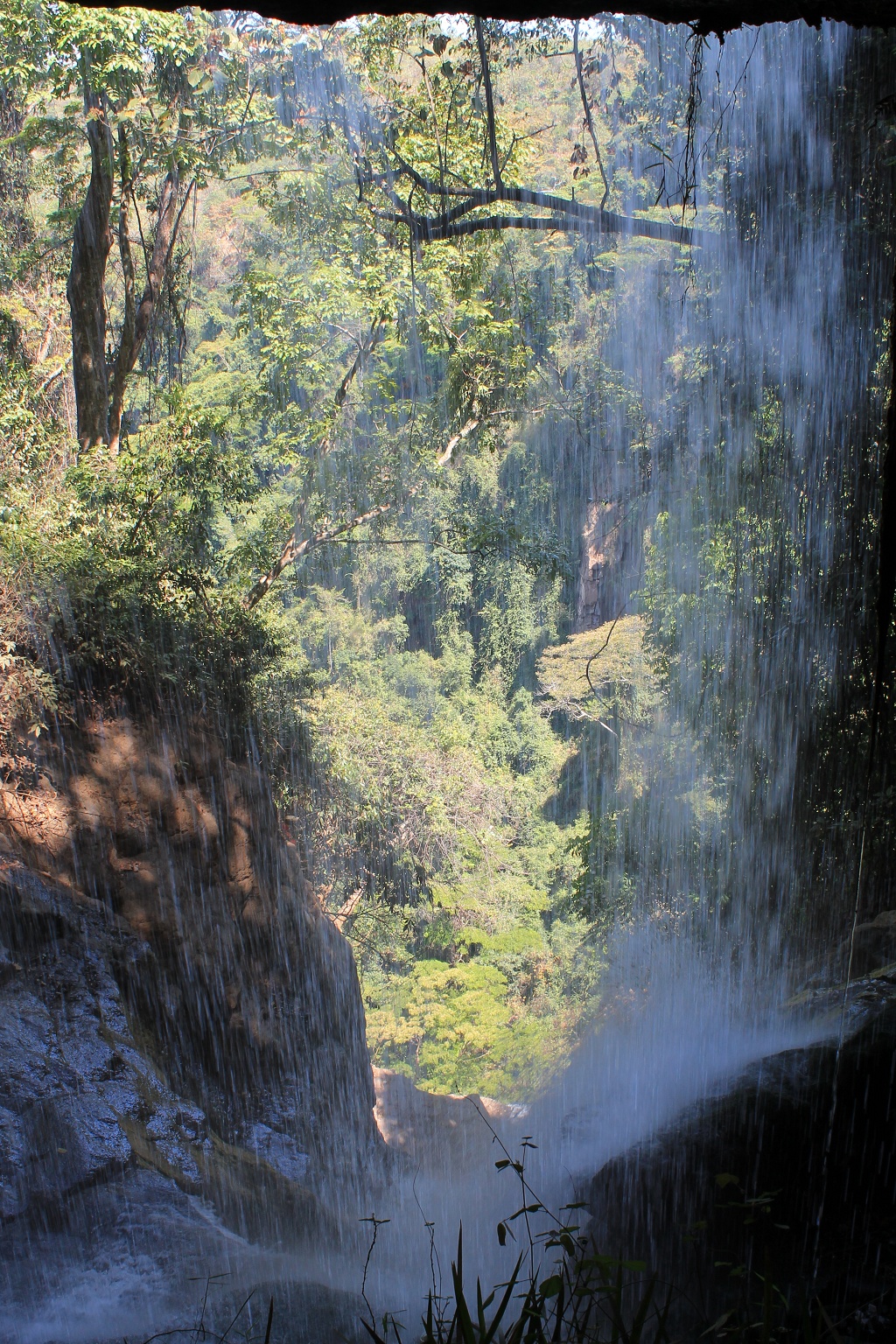
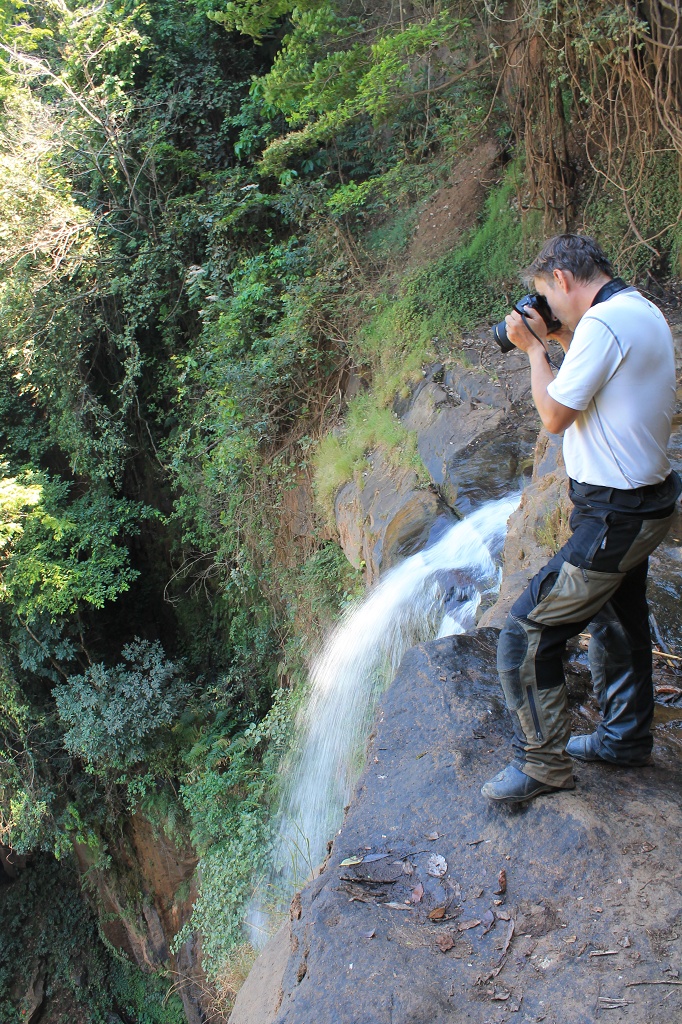
We heard that the lake is also great for diving. Daniel and I wanted to get the scuba diving license and David wanted to dive as well, so we drove down to Kande Beach and started the course right away.
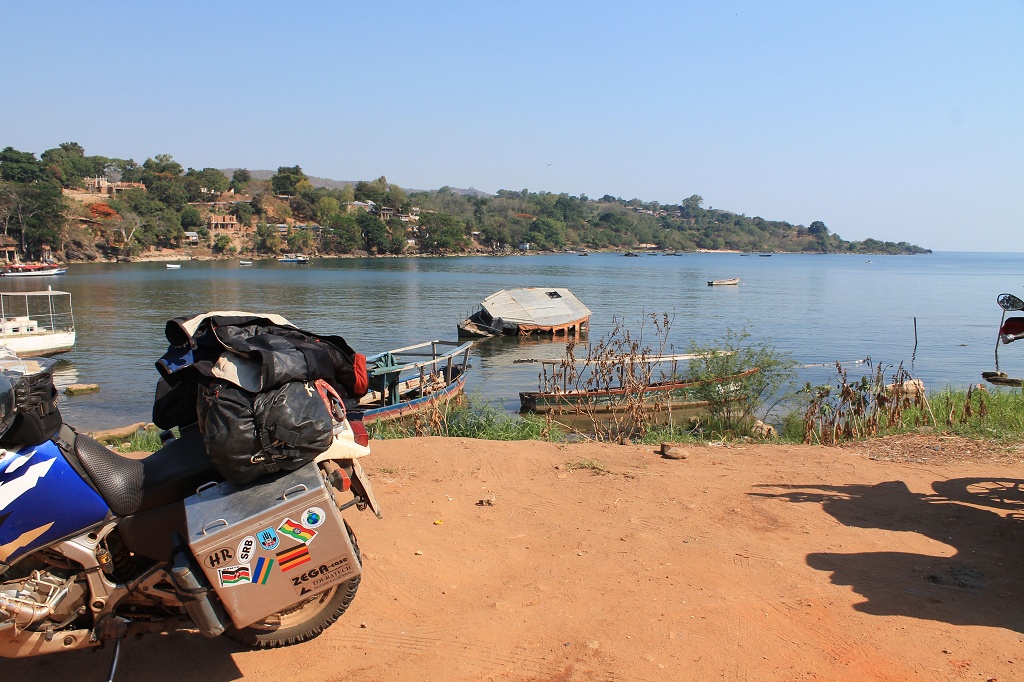
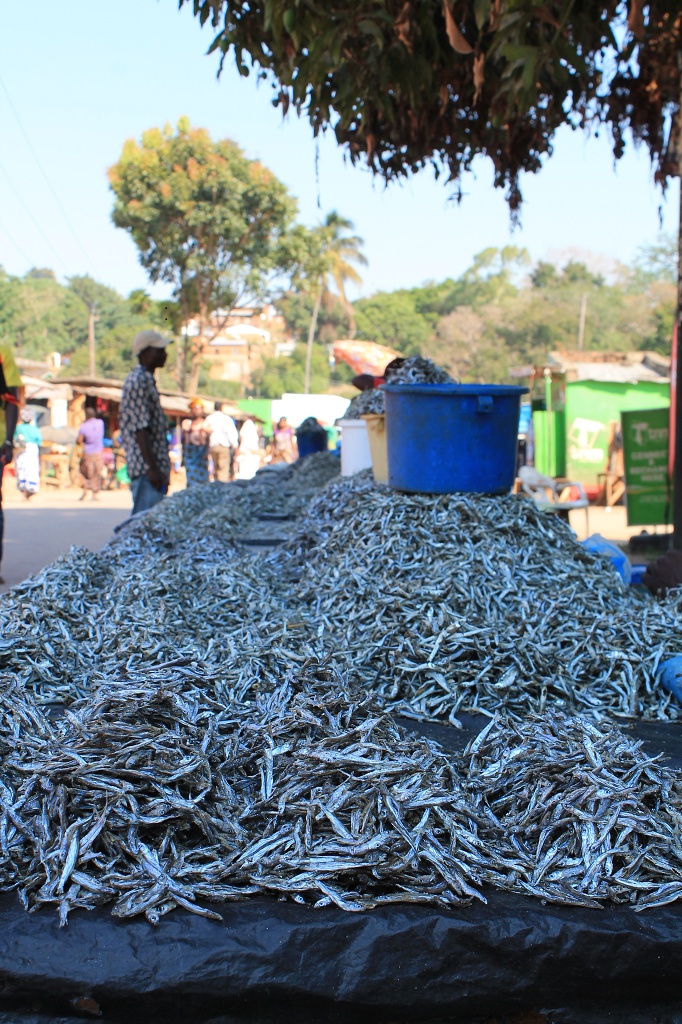
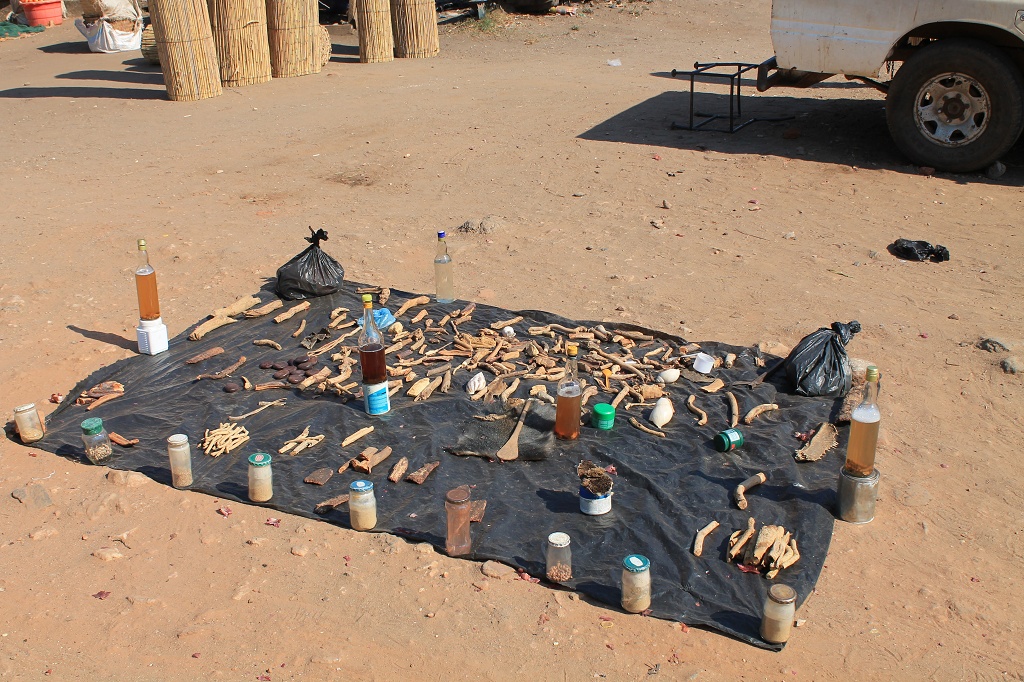
After three days, four open water dives and one exam Daniel and I are now certified divers! That was a fantastic experience. The lake is so warm that no wet suit is needed. Plenty of the small colorful fishes you can buy for your water tank at home originate from Lake Malawi. Diving in this lake is like diving in a warm aquarium!
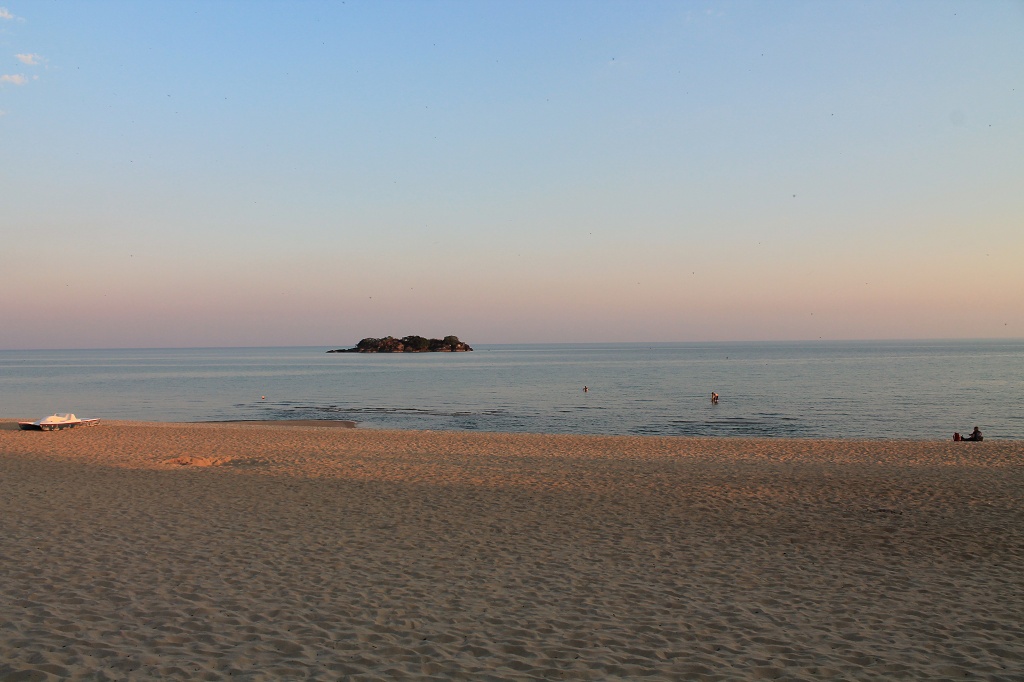
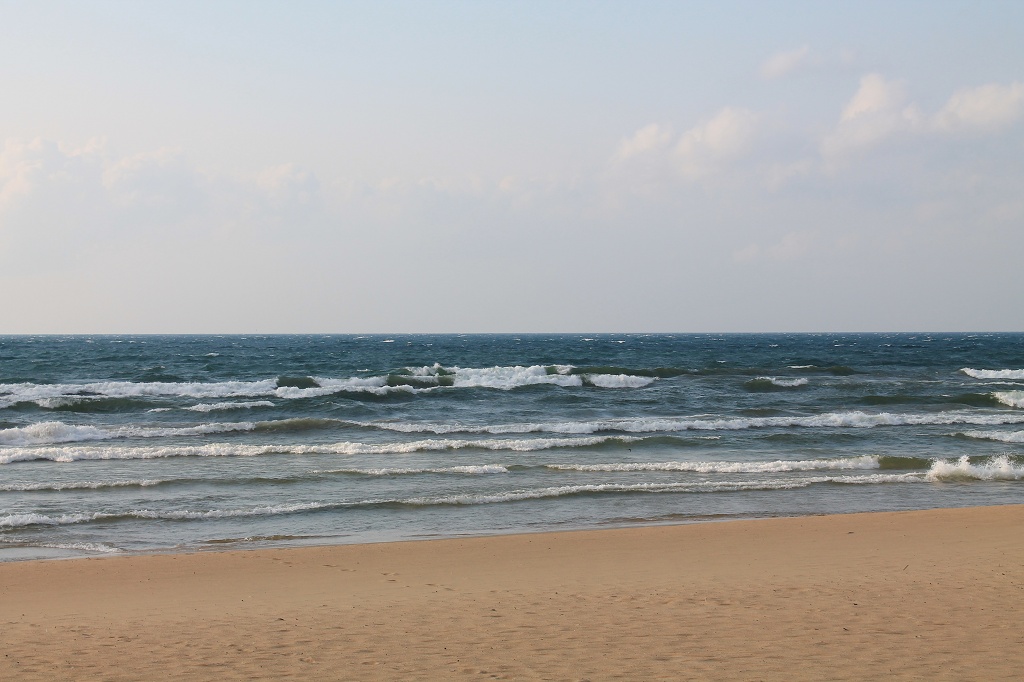
The Kande Camp is heavily frequented by overland trucks. An interesting way of travelling. People book them self into such a truck and ride usually from Nairobi to Cape Town, or only a part and get off. The drivers cover very long distances in one day and long hours are spent on the trucks. The trucks tend to stop at the same places and are mostly frequented by younger customers. The commercial overland experience without any self-planning or cooking. Strange.
After 10 very nice days at the lake we had to leave Malawi. A place we definitely want t visit again!

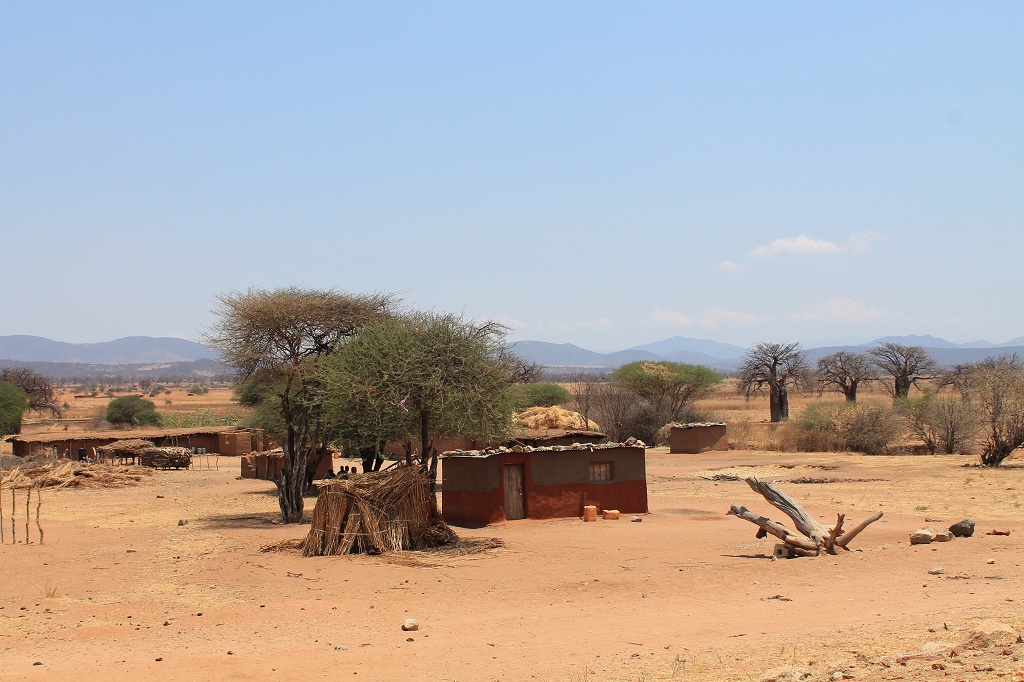
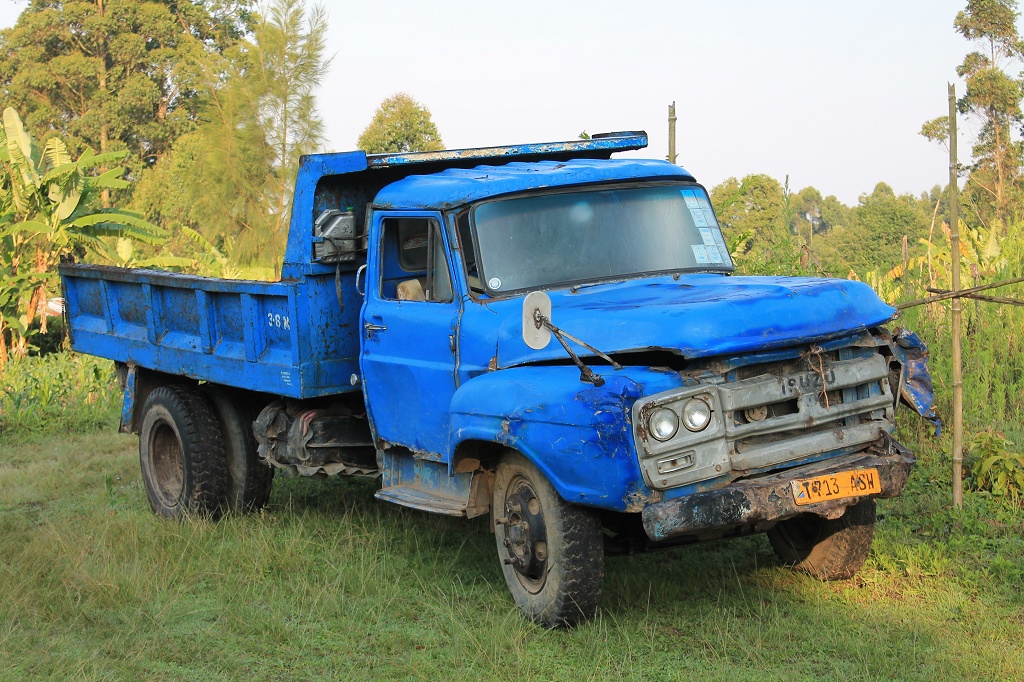
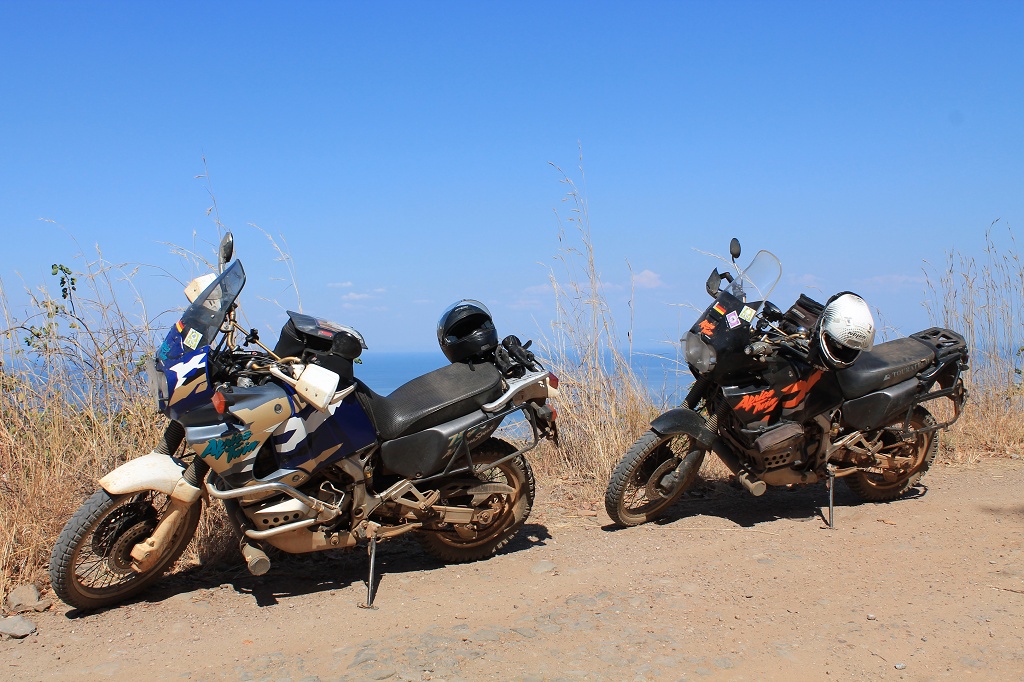
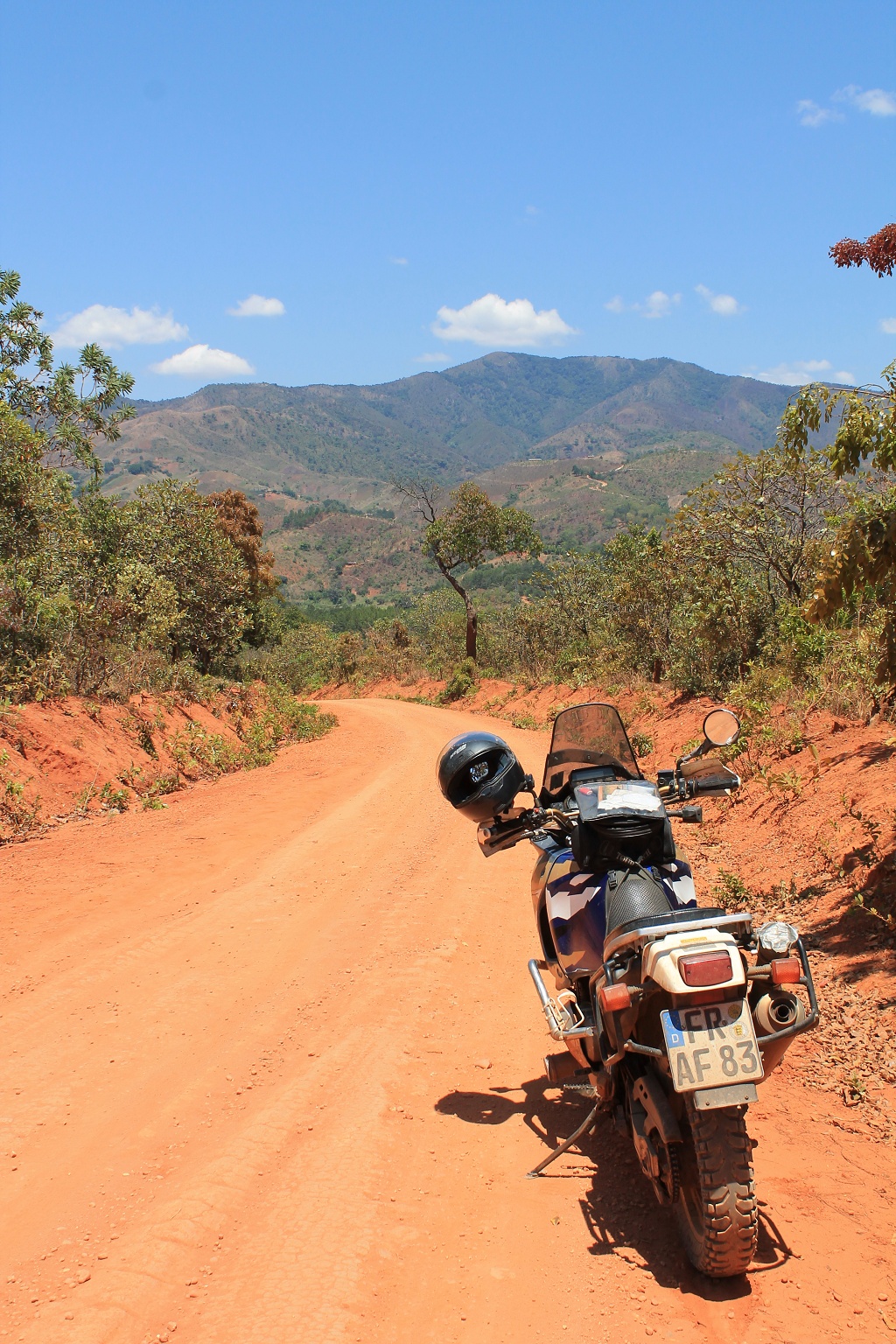
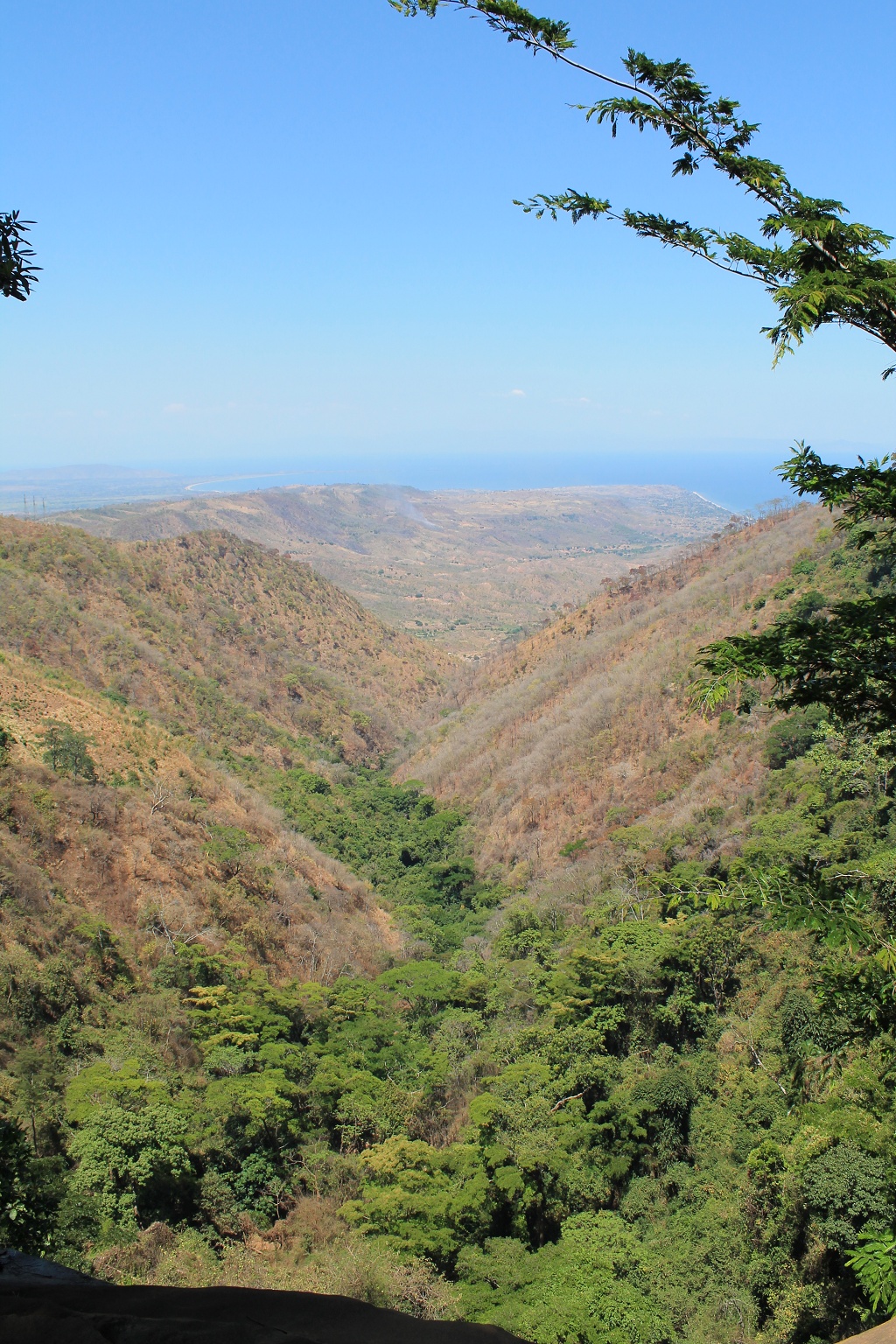
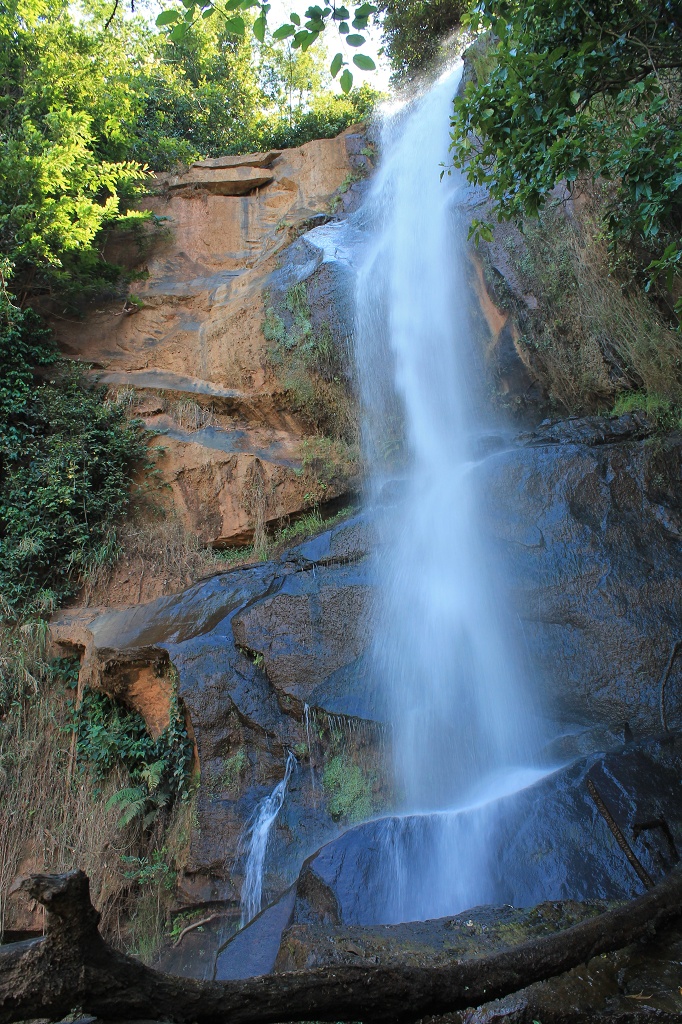
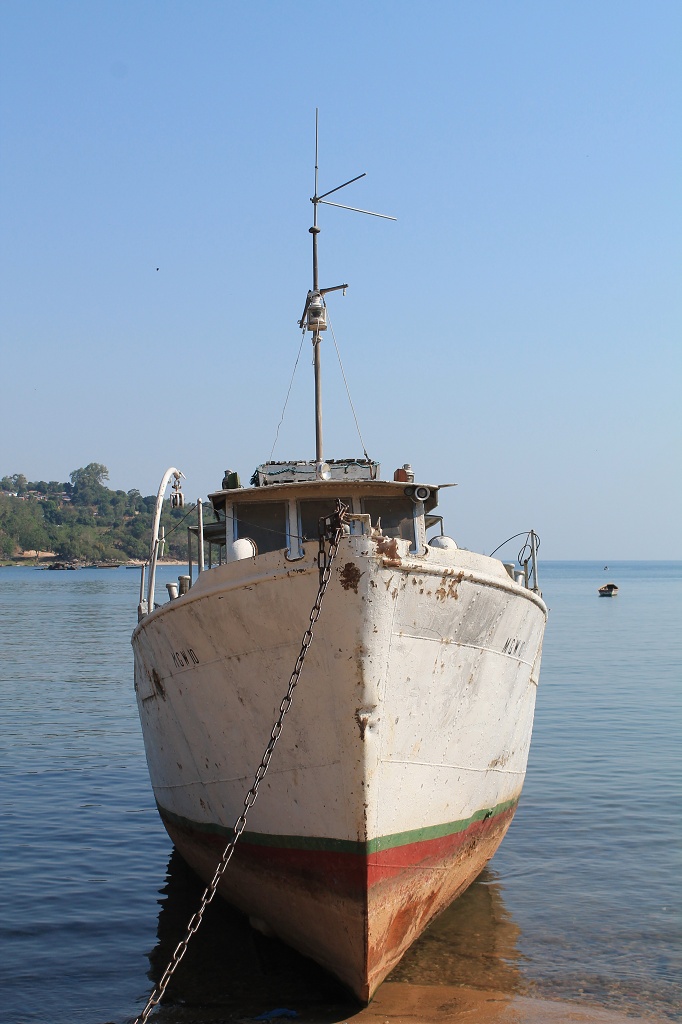
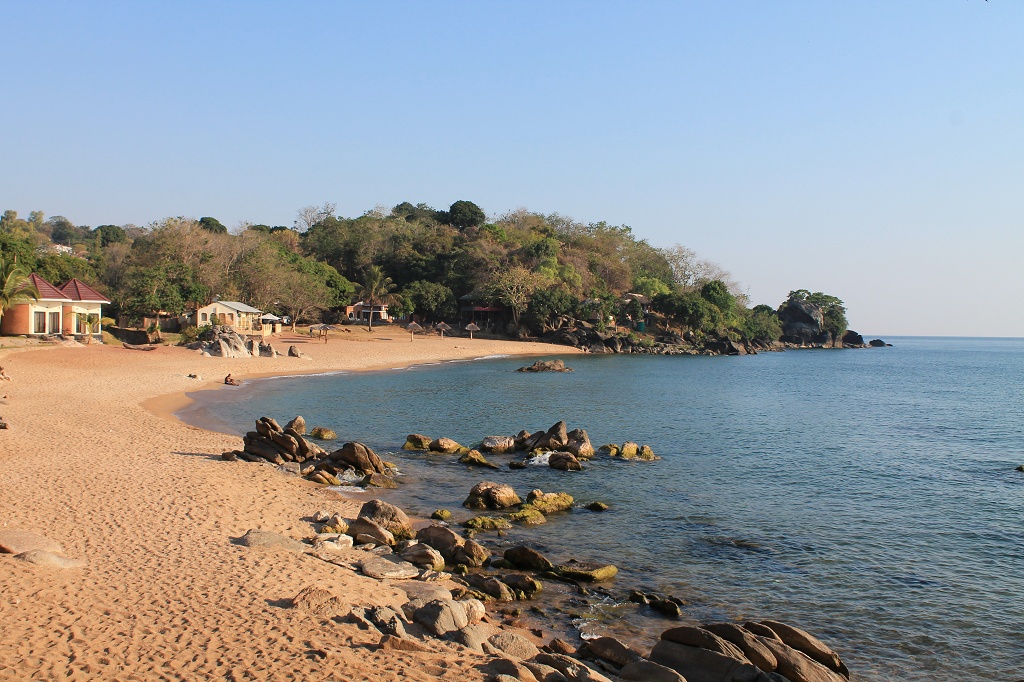
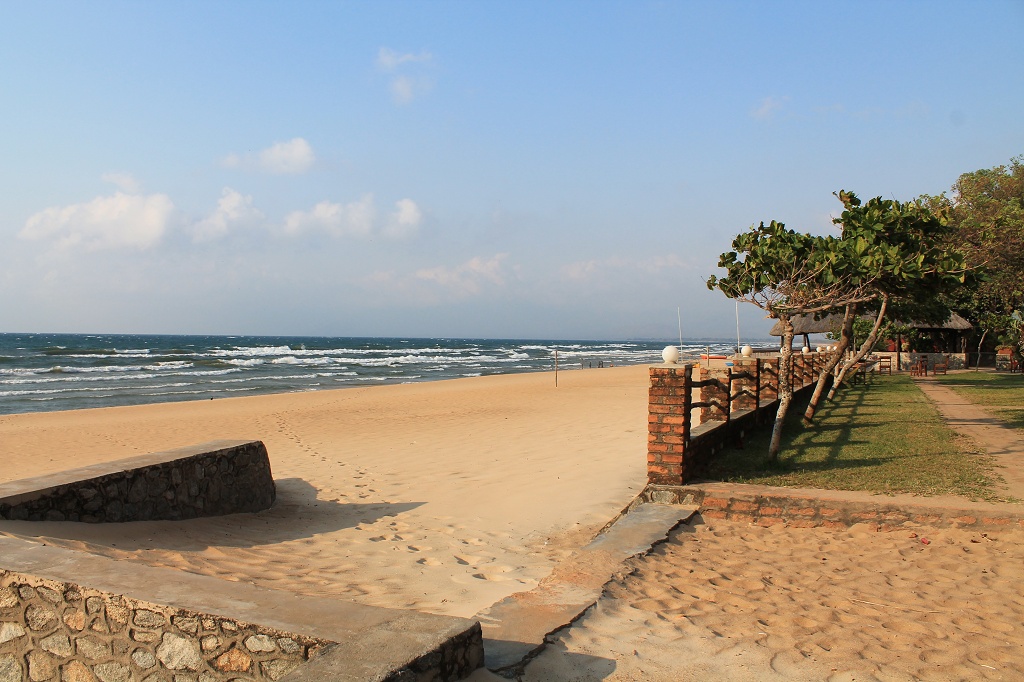
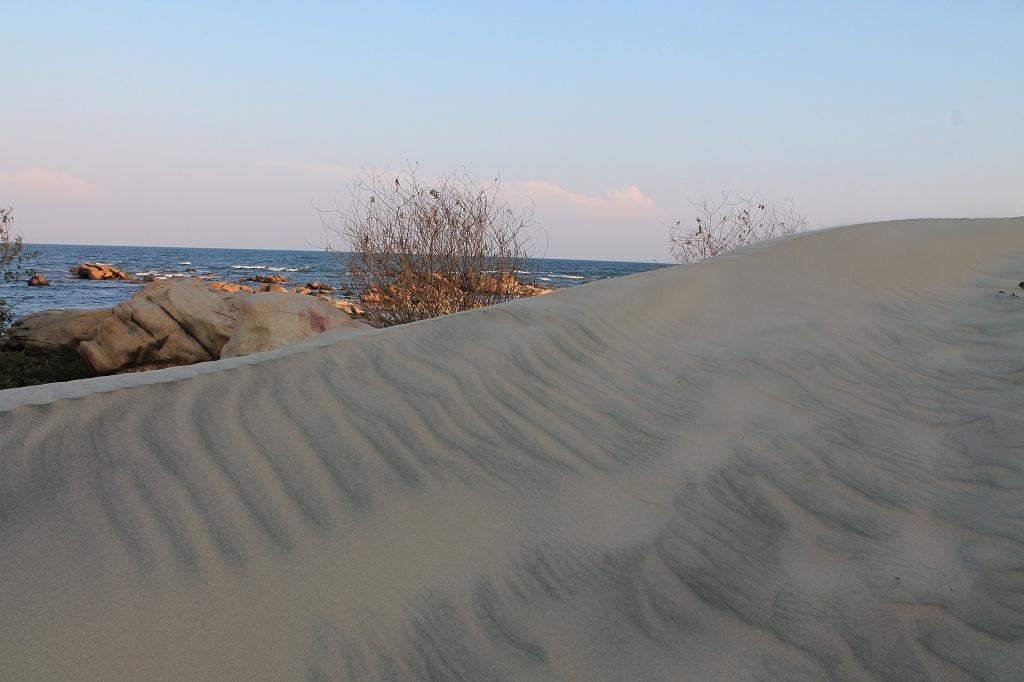
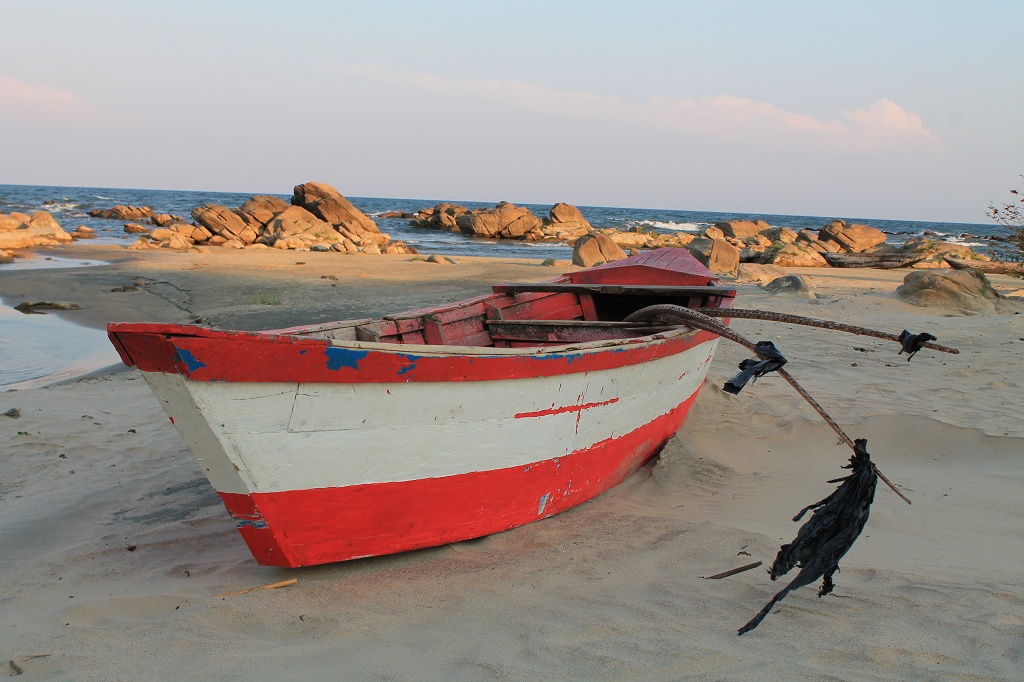
So viele Erlebnisse! Schöne und schreckliche, seltsame und außergewöhnliche. Das Beste ist, dass es Euch gut geht und Ihr weiterhin zu Dritt diese großartigen Erlebnisse teilen könnt. Gute Fahrt Euch allen! Viele liebe Grüße aus dem BNW 🙂
Danke, dass ihr euch die Zeit genommen habt, den Blog weiterzuführen wodurch die erhaltenen Informationen ergänzt werden. Ich kann mir vorstellen, dass die Energie langsam nachlässt, da ihr inzwischen so viele Eindrücke gesammelt habt. Außerdem waren die Erlebnisse teilweise nicht so prickelnd. Glückwunsch zum Tauchschein und dazu, dass ihr schon 3 Monate erfolgreich gemeistert habt. Weiterhin alles Gute.
Eure Fotos und Texte gefallen immer wieder.
Gut zu wissen, dass Ihr inzwischen kurz vor den VicFalls eingetroffen seid. Schade, dass wir uns nicht in Harare treffen konnten, aber Freunde hier sagen, dass Ihr Euch mit dem Nichtdurchreisen von Simbabwe auch die zeitaufwendige Kontrolle durch dutzende von Polizeistopps erspart habt.
Habt eine gute Weiterreise.